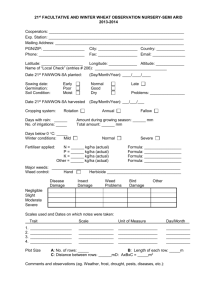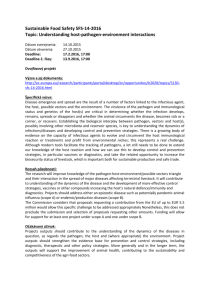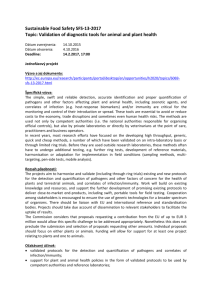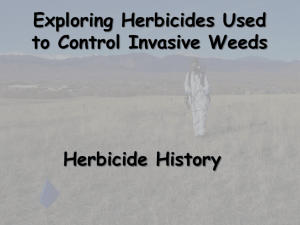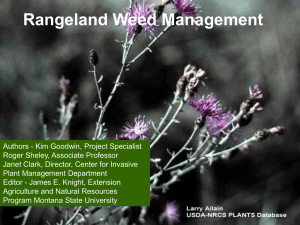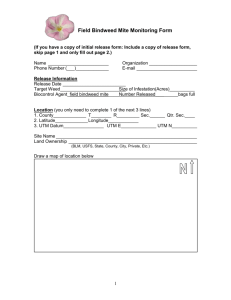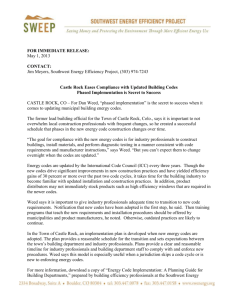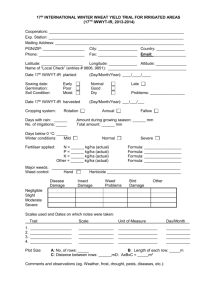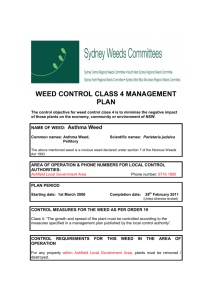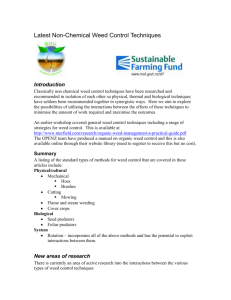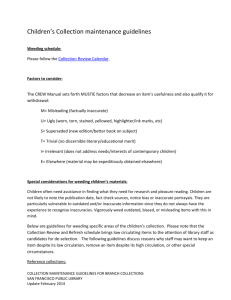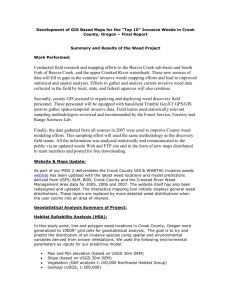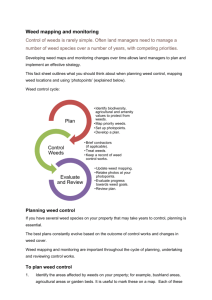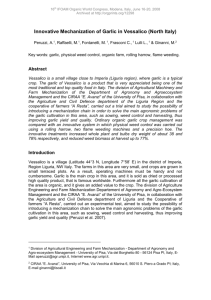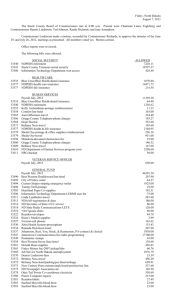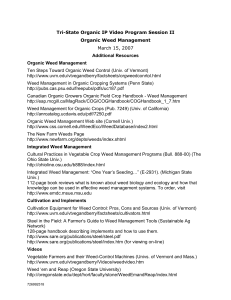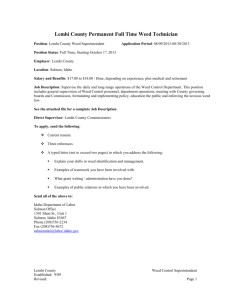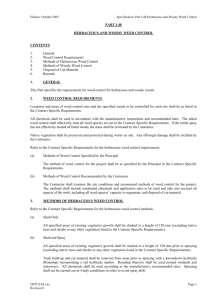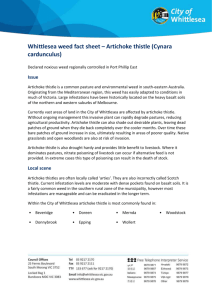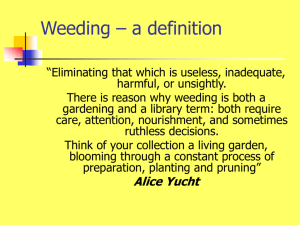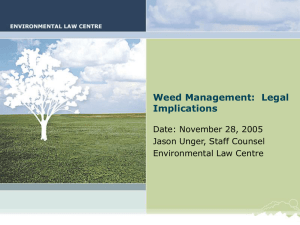Sustainable Food Safety SFS-06-2016 Topic: Weeding – Strategies
advertisement
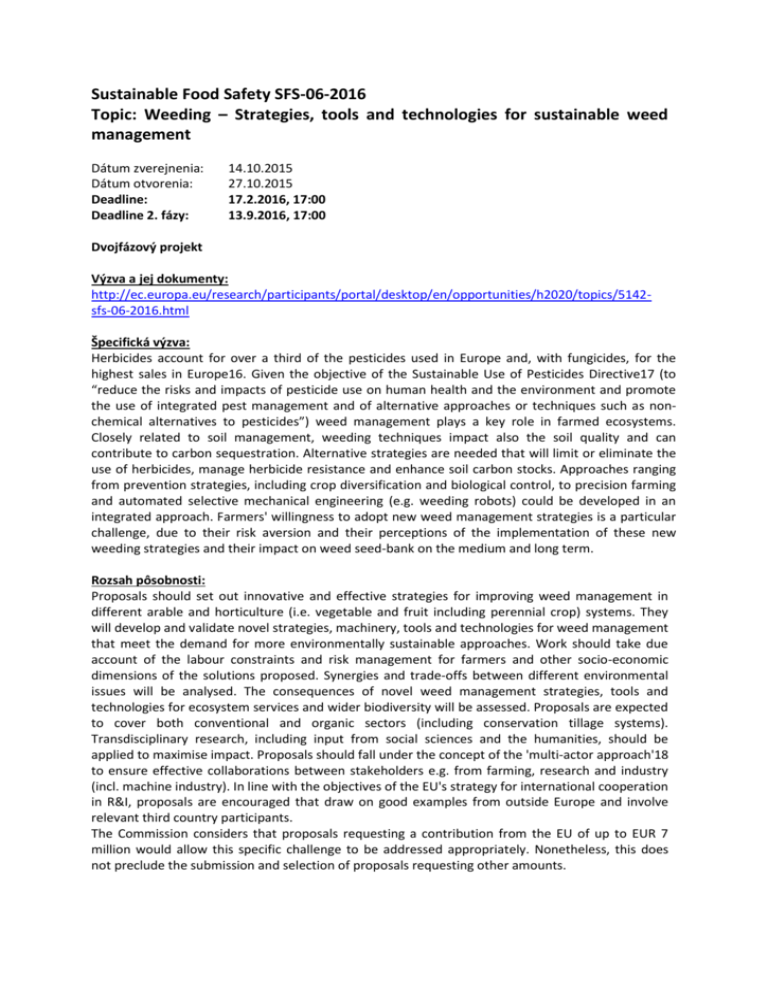
Sustainable Food Safety SFS-06-2016 Topic: Weeding – Strategies, tools and technologies for sustainable weed management Dátum zverejnenia: Dátum otvorenia: Deadline: Deadline 2. fázy: 14.10.2015 27.10.2015 17.2.2016, 17:00 13.9.2016, 17:00 Dvojfázový projekt Výzva a jej dokumenty: http://ec.europa.eu/research/participants/portal/desktop/en/opportunities/h2020/topics/5142sfs-06-2016.html Špecifická výzva: Herbicides account for over a third of the pesticides used in Europe and, with fungicides, for the highest sales in Europe16. Given the objective of the Sustainable Use of Pesticides Directive17 (to “reduce the risks and impacts of pesticide use on human health and the environment and promote the use of integrated pest management and of alternative approaches or techniques such as nonchemical alternatives to pesticides”) weed management plays a key role in farmed ecosystems. Closely related to soil management, weeding techniques impact also the soil quality and can contribute to carbon sequestration. Alternative strategies are needed that will limit or eliminate the use of herbicides, manage herbicide resistance and enhance soil carbon stocks. Approaches ranging from prevention strategies, including crop diversification and biological control, to precision farming and automated selective mechanical engineering (e.g. weeding robots) could be developed in an integrated approach. Farmers' willingness to adopt new weed management strategies is a particular challenge, due to their risk aversion and their perceptions of the implementation of these new weeding strategies and their impact on weed seed-bank on the medium and long term. Rozsah pôsobnosti: Proposals should set out innovative and effective strategies for improving weed management in different arable and horticulture (i.e. vegetable and fruit including perennial crop) systems. They will develop and validate novel strategies, machinery, tools and technologies for weed management that meet the demand for more environmentally sustainable approaches. Work should take due account of the labour constraints and risk management for farmers and other socio-economic dimensions of the solutions proposed. Synergies and trade-offs between different environmental issues will be analysed. The consequences of novel weed management strategies, tools and technologies for ecosystem services and wider biodiversity will be assessed. Proposals are expected to cover both conventional and organic sectors (including conservation tillage systems). Transdisciplinary research, including input from social sciences and the humanities, should be applied to maximise impact. Proposals should fall under the concept of the 'multi-actor approach'18 to ensure effective collaborations between stakeholders e.g. from farming, research and industry (incl. machine industry). In line with the objectives of the EU's strategy for international cooperation in R&I, proposals are encouraged that draw on good examples from outside Europe and involve relevant third country participants. The Commission considers that proposals requesting a contribution from the EU of up to EUR 7 million would allow this specific challenge to be addressed appropriately. Nonetheless, this does not preclude the submission and selection of proposals requesting other amounts. Očakávaný účinok: transfer to the farming community of scientific knowledge regarding weed control, e.g. new integrated weed management strategies and decision support tools; more efficient and viable weed control techniques for organic and conventional farming; reduced environmental impact of weed control: improved ground- and surface-water quality, reduced threats to biodiversity and wildlife, including in-field and in soils, protected and enhanced soil carbon stocks; strengthening of transdisciplinary research and use of the multi-actor approach to ensure longlasting implementation of the results obtained; and provision of scientific support for relevant EU policies19. Typ opatrenia: RIA (Research and Innovation Action), financovanie 100 % Spôsobilosť: minimálne 3 nezávislé právne subjekty z rôznych členských štátov EÚ alebo pridružených krajín elektronická prihláška čitateľnosť, dostupnosť, možnosť tlače životopis primárne zodpovedných osôb zoznam 1 – 5 relevantných publikácií/produktov/služieb/iných úspechov zoznam 1 – 5 relevantných predošlých projektov/aktivít opis relevantnej infraštruktúry alebo technického vybavenia opis tretích strán, ktoré nie sú partnermi ale budú prispievateľmi návrh plánu využívania a diseminácie výsledkov ak nie je definované inak – nevyžaduje sa pri prvej fáze dvojfázových postupov dodržanie obmedzenia počtu strán – v prvej fáze sa vyžaduje 10 strán (strany nad obmedzený počet nebudú brať hodnotiaci do úvahy) Harmonogram: Informovanie o výsledkoch: Pre prvú fázu: max. do 3 mesiacov od deadlinu pre podanie návrhov Pre druhú fázu: max. do 5 mesiacov od deadlinu pre podanie návrhov Podpis grantovej dohody max. do 8 mesiacov od deadlinu pre podanie návrhov
